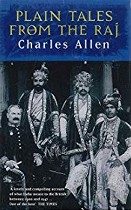 Charles Allen •
Charles Allen •
Plain Tales from the Raj •
Plain Tales is a fascinating collection of stories from Britishers who made their home in India during the Raj. The editor drew on printed sources but also conducted extensive interviews in his quest for authentic material. He is, however, quick to point out that this is in no way a defense of British colonial rule.
The first-person accounts begin with children who were born in India and experienced it largely at a sensory level—a land of pungent smells and scorching heat, indulgent servants and thrilling upcountry trips. “First memories are of mosquito nets, of ponies rather than prams, of a father ‘killing a snake in my bathroom’ . . . Their first common image is of ayah.”
Others came to India as young men, lured by the prospect of distinguishing themselves in the civil service—or by the sheer romance of Kipling (the book’s title is a nod to his Plain Tales from the Hills). They, in turn, lured the Fishing Fleet—young women looking for husbands. Unsuccessful fishers who sailed back to England still unwed were dubbed the Returning Empties.
The chapters, garnished with full-page period photos and watercolors, detail common elements of Anglo-Indian life: the club (“Sociability was gauged in very large measure by drinking habits”), hill stations (“Those who went after the ladies were known as ‘poodle-fakers’ ”), sports (“Crows would come down and pick your [golf] ball up and fly away with it”). We learn that Muslim leader Jinnah “was always five minutes late, whereas Mahatma Gandhi was always five minutes early.”
Along with Paul Scott’s Raj Quartet, which appeared around the same time, Plain Tales is credited with inspiring a resurgence of interest in this controversial historic era. And history is ever at its most compelling when told by those who experienced it firsthand.






Your email address will not be published.